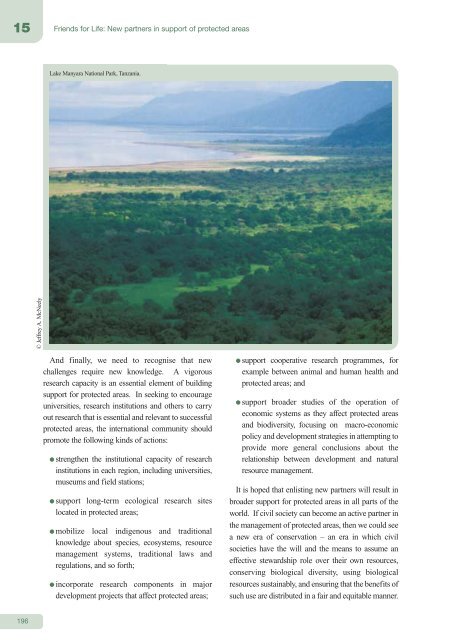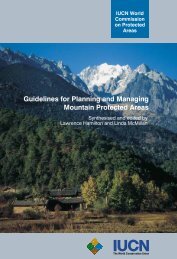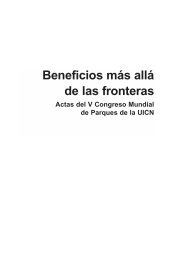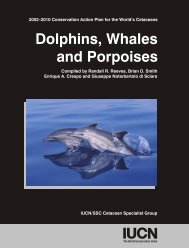1.Front section - IUCN
1.Front section - IUCN
1.Front section - IUCN
You also want an ePaper? Increase the reach of your titles
YUMPU automatically turns print PDFs into web optimized ePapers that Google loves.
15<br />
Friends for Life: New partners in support of protected areas<br />
Lake Manyara National Park, Tanzania.<br />
© Jeffrey A. McNeely<br />
And finally, we need to recognise that new<br />
challenges require new knowledge. A vigorous<br />
research capacity is an essential element of building<br />
support for protected areas. In seeking to encourage<br />
universities, research institutions and others to carry<br />
out research that is essential and relevant to successful<br />
protected areas, the international community should<br />
promote the following kinds of actions:<br />
● strengthen the institutional capacity of research<br />
institutions in each region, including universities,<br />
museums and field stations;<br />
● support long-term ecological research sites<br />
located in protected areas;<br />
● mobilize local indigenous and traditional<br />
knowledge about species, ecosystems, resource<br />
management systems, traditional laws and<br />
regulations, and so forth;<br />
● incorporate research components in major<br />
development projects that affect protected areas;<br />
● support cooperative research programmes, for<br />
example between animal and human health and<br />
protected areas; and<br />
● support broader studies of the operation of<br />
economic systems as they affect protected areas<br />
and biodiversity, focusing on macro-economic<br />
policy and development strategies in attempting to<br />
provide more general conclusions about the<br />
relationship between development and natural<br />
resource management.<br />
It is hoped that enlisting new partners will result in<br />
broader support for protected areas in all parts of the<br />
world. If civil society can become an active partner in<br />
the management of protected areas, then we could see<br />
a new era of conservation – an era in which civil<br />
societies have the will and the means to assume an<br />
effective stewardship role over their own resources,<br />
conserving biological diversity, using biological<br />
resources sustainably, and ensuring that the benefits of<br />
such use are distributed in a fair and equitable manner.<br />
196






